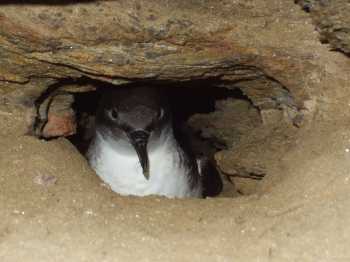The Vulnerable Yelkouan Shearwater Puffinus yelkouan has been identified as a potential candidate for listing within the Albatross and Petrel Agreement. Karen Bourgeois (A dos d’îles, Association for the Study and Conservation of Insular Biodiversity, Lançon de Provence, France) and colleagues report a good-news story in the journal Biological Invasions of a small population recovering on two Tunisian islands after the successful removal of long-introduced rodents.
The paper’s abstract follows:
“The ship rat (Rattus rattus) was introduced 1,500 years ago to the Zembra Archipelago (Tunisia) and was eradicated in October–November 2009 on two of its islands, Zembretta and Zembrettina. This eradication was performed 2 years after the discovery of a small colony of Yelkouan shearwaters (Puffinus yelkouan), a species recently up-listed to the vulnerable IUCN extinction risk category. For 2 years before and 3 years after rat eradication, the Zembretta Yelkouan shearwater breeding colony was checked yearly at the end of the breeding season. The number of recorded breeding pairs reaching 176 and 145, respectively, increases of 10.4 and 8.5-fold two and 3 years after rat eradication. This experiment shows that eradication of an ancient introduced ship rat population has dramatically improved the Zembretta Yelkouan shearwater breeding population very quickly. This result suggests that managing even long-introduced populations might well be fruitful.”

A Yelkouan Shearwater looks out of its burrow
Photograph by Jérôme Legrand
Reference:
Bourgeois, K., Ouni, R., Pascal, M., Dromzée, S., Fourcy, D. & Abiadh, A. 2013. Dramatic increase in the Zembretta Yelkouan Shearwater breeding population following ship rat eradication spurs interest in managing a 1500-year old invasion. Biological Invasions 15: 475-482.
John Cooper, ACAP Information Officer, 27 February 2013

 English
English  Français
Français  Español
Español